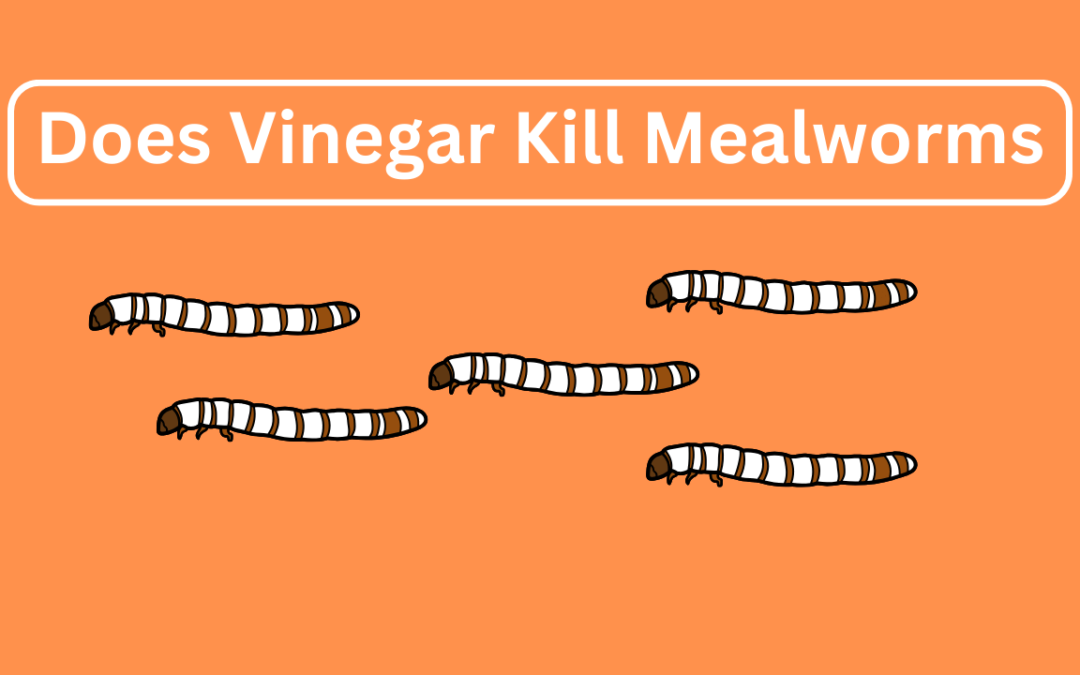When it comes to natural pest control, many of us turn to age-old solutions often found in our pantry. One such solution is vinegar, a household staple known for its versatile use in cleaning, cooking, and even health remedies. But the question arises: Does vinegar kill mealworms? These tiny critters, known for lurking in stored grains, can be a real headache for homeowners. Vinegar is touted for its pest-deterrent properties, particularly in its acetic essence. While it’s a champion at warding off certain pests, its effectiveness against mealworms is more complex. Rather than being a lethal weapon, vinegar acts more as a repellent. Its acidic nature can disrupt the environment in which mealworms thrive, making it less inviting for them. However, there might be better solutions than vinegar if you want a quick, decisive blow against these pests.
Table of Content
- Does Vinegar Kill Mealworms?
- What are Mealworms?
- How To Use Vinegar Kill Mealworms
- Experiments and Studies on Vinegar’s Effectiveness
- Alternatives to Vinegar Kill Mealworms
- Conclusion
- FAQs on Does Vinegar Kill Mealworms?
- Does vinegar kill mealworms instantly or over time?
- Can all types of vinegar be used against mealworms?
- Is vinegar safe to use around pets and children for pest control?
- Are there any risks to using vinegar as a pest control method?
- How does vinegar compare to commercial mealworm control products?
What are Mealworms?
Mealworms, often mistaken as worms, are the larval form of the mealworm beetle. These little creatures are about half an inch long, with a hardy appetite, particularly for grains. Found chiefly in dark, damp places, they are common in many households, especially in pantries or where pet food is stored. Contrary to their name, mealworms aren’t just found in meals; they thrive on various decaying organic materials. Fascinatingly, they’re not only considered pests. In some cultures, mealworms are a sustainable protein source, and they even hold the potential for waste decomposition. Their lifecycle, from egg to beetle, is a marvel of nature, showcasing insect life’s incredible adaptability and diversity.
How To Use Vinegar Kill Mealworms
Combating mealworms with vinegar is more about creating an unwelcoming environment than outright extermination. Mix equal water and white vinegar to start – the more acidic, the better. This diluted solution can be sprayed directly onto surfaces where mealworms are frequently seen, such as in cupboards or near pet food storage areas. The key is consistency; regularly clean these areas with the vinegar solution. While it won’t instantly kill mealworms, the acidic nature of vinegar disrupts their habitat, making it less appealing for them to stick around. It’s a simple, eco-friendly approach that integrates well with other mealworm prevention strategies.Experiments and Studies on Vinegar’s Effectiveness
Thinking about vinegar’s power against pests, you might wonder, ‘What does the science say?’ Researchers have been curious, too. They’ve mixed vinegar solutions, sprayed them on different surfaces, and waited to see what happens. These studies, often found in agricultural journals, aren’t just about mealworms but a bunch of garden-variety pests. The gist? Sometimes, vinegar sends pests running. Other times, it’s a no-go. It’s like every bug responds differently. These experiments, more kitchen science than high-tech lab work, suggest that while vinegar isn’t a cure-all, it’s got a place in the pest control toolbox.Alternatives to Vinegar Kill Mealworms
If vinegar’s not cutting it in your battle against mealworms, don’t worry – there are other tricks to try. How about diatomaceous earth? It’s this powdery stuff made from fossilized algae, and it works wonders by drying out these pests. Then there’s the old-school method of freezing infested grains to bid farewell to mealworms. Some folks prefer pheromone traps, which lure these critters in with the promise of a good time, only to trap them. And let’s not forget about good old cleanliness – regular pantry cleanups can work miracles. Each method has its charm, offering a way to tackle these unwelcome pantry guests without harsh chemicals.Conclusion
In wrapping up, vinegar, with its natural and non-toxic charm, can find a place in your eco-friendly pest control toolkit. But don’t expect it to perform miracles when it comes explicitly to mealworms. Unlike its more decisive action on some other household pests, vinegar’s influence on mealworms is like hitting the pause button, not the stop one. It creates a less inviting environment for them, which can be a valuable part of a broader pest management strategy. Remember, the best approach combines cleanliness, proper storage, and a sprinkle of diatomaceous earth or a pheromone trap for good measure. Vinegar might not be the ultimate mealworm nemesis, but it keeps your pantry pest-free.FAQs on Does Vinegar Kill Mealworms?
We address common questions about using vinegar against mealworms, including safety, types of vinegar, and comparison with other methods.Does vinegar kill mealworms instantly or over time?
Vinegar’s effect on mealworms is more likely to be a deterrent than an instant killer.Can all types of vinegar be used against mealworms?
While all vinegars contain acetic acid, their concentration varies, which may affect their effectiveness.Is vinegar safe to use around pets and children for pest control?
Vinegar is generally safe, but it’s always wise to use it cautiously.Are there any risks to using vinegar as a pest control method?
The primary risk is its limited effectiveness compared to other methods.How does vinegar compare to commercial mealworm control products?
Vinegar is more eco-friendly and safer but may not be as effective as some commercial products.If you are looking for Bedbugs Services in Dhaka. Call Us Today

